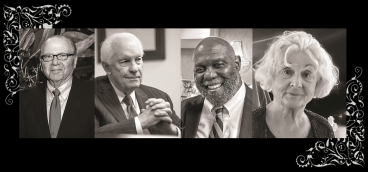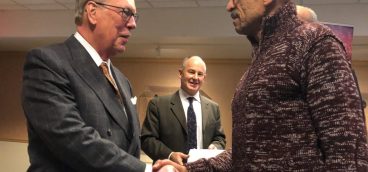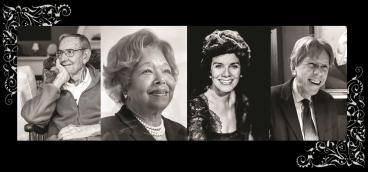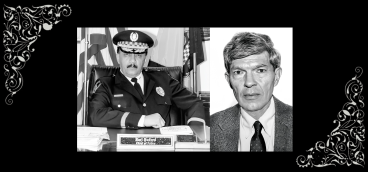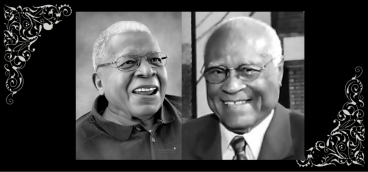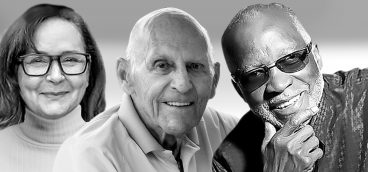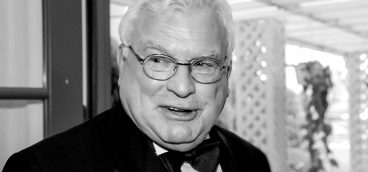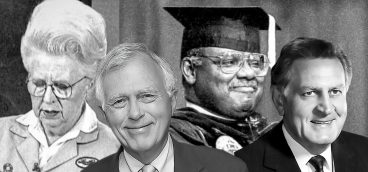Springer, Thorbecke, Sagan, King, Miclot, Wolfley, Tansky, Wholey, Myers, Fagan, Tambellini, Kampmeinert, Hotopp, Truter
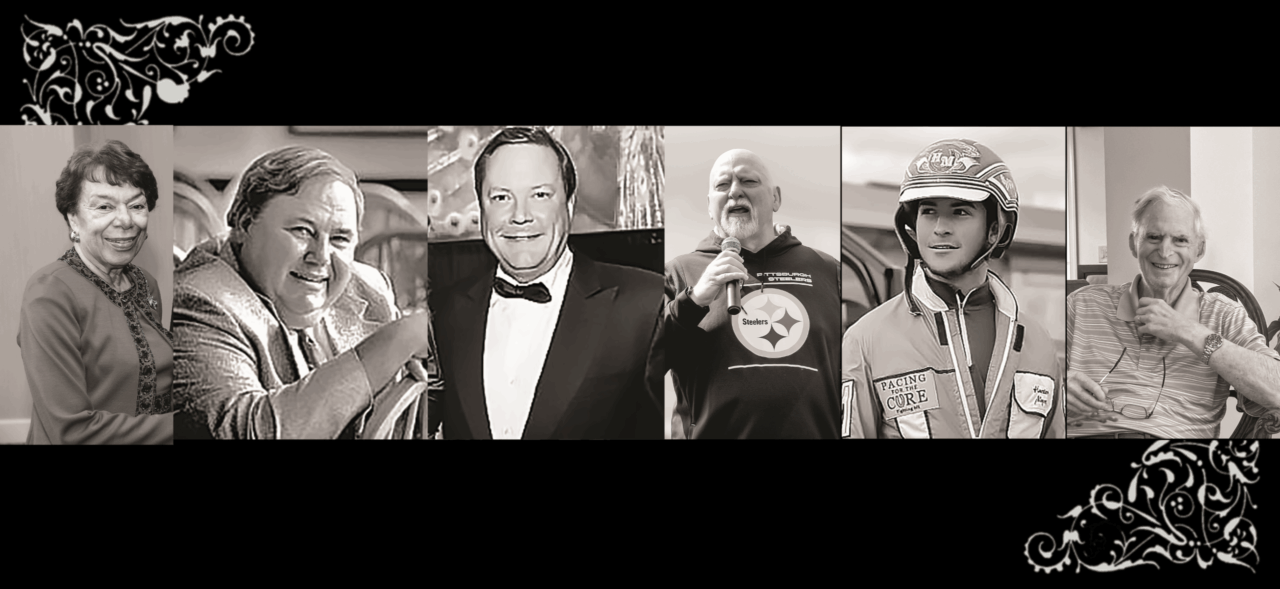
Cecile Springer, 94
Armed with master’s degrees in chemistry and urban and regional planning, Springer was well prepared for a diverse life. A research chemist for Bristol Myers and Schering Pharmaceuticals, she joined Westinghouse Electric as manager of product development for the Advanced Energy Systems Division. From 1978 to 1989, she served as director of Contributions and Community Affairs as president of the Westinghouse Foundation. Springer co-founded the Women and Girls Foundation and held leadership roles in the NAACP, the League of Women Voters, and Pitt’s Alumni Association. She was an emerita member of the Board of Trustees of Penn State and served on the boards of Carlow University, Slippery Rock University, the Carnegie Museums of Pittsburgh and Carnegie Library. She was named a Distinguished Daughter of Pennsylvania
Sonia Thorbecke, 103
Her father was Leopold Stokowski, one of the leading conductors of the early and mid-20th century and music director of the Philadelphia Orchestra, Cincinnati Symphony Orchestra, NBC Symphony Orchestra and New York Philharmonic Orchestra, among others. Thorbecke was a Broadway actress who studied at the Neighborhood Playhouse in New York before marrying and having four children. For the last 49 years, she lived on Deerhaven Farm in Sewickley, where she raised thoroughbred horses, was an active member of the Sewickley Hunt and founder of Riding for the Handicapped in Western Pennsylvania.
Dr. Elizabeth Sagan, 71
Her drive was evident early — she was captain of her tennis team at Cornell. Sagan dedicated herself to training other doctors, including generations of urology residents and urogynecology and reconstructive pelvic surgery fellows. Locally, Sagan was one of the first female urologists in a male-dominated field, and she specialized in helping women, especially pregnant women, with bladder issues. It turned out to be a huge, under-served field. Practicing out of UPMC Magee-Womens Hospital, she pioneered new surgical techniques and helped to shape an emerging field — all while raising four children as a single mother.
Hartley King, 91
His jovial face was on billboards advertising a big breakfast and other fare as the owner of Kings Family Restaurants. In 1967, King invested in a struggling restaurant, the Pig-N-Go, and grew Kings into 36 locations in western Pennsylvania and Ohio. He worked for his father’s oil distributorship but was fired in 1972 for spending too much time on his restaurant. Years later, he bought the business, renamed it Mon Valley Petroleum, and served as CEO until it was sold in 2012. He was also a developer who joined a group with Gary Player to build the Diamond Run Golf Club and was active in numerous charities, including Make-A-Wish, Children’s Hospital and the Leukemia Society.
John Miclot, 66
He volunteered at the Fox Chapel VFD and then started national initiatives to protect firefighters from exposure to carcinogens. But Miclot wore many other hats. An entrepreneur and venture capitalist, he played a pivotal role in advancing medical technology and healthcare innovation. His career included being CEO of Respironics, LinguaFlex and CCS Medical and executive positions at Tengion, Healthdyne Technologies, Medex and Warburg Pincus, among others. He held the first endowed chair in Sleep Science at the University of Pennsylvania and established the College of Business and Lab of Sales at the University of Iowa. He was also a board member of the Pittsburgh Zoo and St. Margaret Foundation
Craig Wolfley, 66
A native of Buffalo, New York, Wolfley was an offensive lineman for the Pittsburgh Steelers from 1980-89, but was better known the past several years as a color commentator on the Steelers Radio Network. The 6-foot, 1-in, 265-pound lineman’s experience in the football trenches made him a popular announcer when he replaced his best friend and former Steeler teammate, Tunch Ilkin, after Ilkin died in late 2021.
Burt Tansky, 87
The former CEO of Neiman Marcus was known in the retail industry for his eye for quality and emphasis on the customer experience. Tansky began his career at Kaufmann’s and went on to executive roles at Saks Fifth Avenue and Bergdorf Goodman before guiding Neiman Marcus to record sales. The son of Russian immigrants, he graduated from Pitt and with his sister, Eva Tansky Blum, became a trustee and helped the university raise $2.1 billion in a record-breaking fundraising campaign. The siblings established the William Pitt Union’s Tansky Family Lounge and the Tansky Family Fund, which supports Alzheimer’s research at Pitt. Tansky was awarded the Chevalier de la Légion d’Honneur from the French government for promoting French-made goods.
Dr. Mark Wholey, 97
Though his family was famous for the Strip District fish business founded in 1912, Wholey chose a different path when his father told him he was bad with customers. He became a doctor, and then a pioneer and inventor in the field of interventional radiology. An NIH fellowship in Sweden exposed him to angiography, a new form of imaging that visualized blood vessels through X-rays. Returning to Pittsburgh, Wholey introduced angiography to Shadyside Hospital, where he was chairman of Radiology and director of Cardiovascular and Interventional Radiology. He designed the first flow-controlled angiographic injector. He also developed a number of other devices, including steerable guide wires and stents.
Hunter Myers, 27
He was a rising star in the world of harness racing when a freak, multiple-horse accident at The Meadows led to his injury and subsequent death. Myers came from a family that loved horses and he began competing in races in 2014, splitting his time between tracks in Ohio and Pennsylvania. In his career, he won 2,450 races and drove horses to more than $23.8 million in prize money. He was considered one of the top 10 drivers in the United States and was known both for his dedication and kindness. Myers was the first racing death at The Meadows since it opened in 1963.
Charles Fagan, 88
He was educated at Phillips Academy Andover and Yale University and joined the Reserve Officers’ Training Corps shortly after graduation. By the end of his commission as a tactical officer at the Officer Candidate School at Fort Benning, Fagan was made a captain. He moved on to finance and worked at Federated Investors for 10 years before leaving in 1968 to become an advance man for Richard Nixon’s campaign at the request of Elsie Hillman. After the election he was appointed deputy secretary of Commerce and relocated to Belgium. He left government service in 1977 and worked as an international consultant until retiring in 2017, which gave him lots of time to visit his beloved Fort Ligonier
Bruno Tambellini, 99
Tambellini was the last surviving sibling of a family that built a dynasty with Italian food. Born in Italy, he graduated from Pitt with a degree in chemical engineering and worked with Willard Rockwell at Rockwell Manufacturing. But food was in his genes. His brother Alex opened Tambellini’s on Wood Street and another brother, Louis, opened Louis Tambellini’s on Route 51. Soon Tambellini was making sausage at home and selling it from his car. Eventually he built a processing plant that employed 150. His frozen food and sausages were popular in 11 states before he sold the company in a multimillion-dollar deal. Then he opened Tambellini’s North Park in 1984, with a second location in Bridgeville. And at 95 he wrote “Hot Sausage: My Adventure, Not a Cookboo
Robert Kampmeinert, 81
A native of St. Louis, he was a cum laude graduate of Lehigh University before earning an MBA from Harvard. After a stint at Kidder Peabody, he was recruited to Pittsburgh to start the corporate finance dept. at Parker Hunter. Kampmeinert became CEO of the firm — one of Pittsburgh’s biggest wealth managers — in 1985 and Chairman in 1991, until it merged with Janney Montgomery Scott. He chaired the Nominating Committee of the New York Stock Exchange and helped countless Pittsburgh start-ups. Kampmeinert was a friendly, thoughtful man, involved in numerous civic boards and clubs and deeply devoted to his family.
Tom Hotopp, 83
Hotopp was a longtime board member of the Pittsburgh Symphony Orchestra and President of leading Pittsburgh company Mine Safety Appliances (MSA). During his 11-year tenure as President of MSA, he introduced total quality of management into the manufacturing process. The Notre Dame graduate earned an MBA from Stanford before coming to Pittsburgh. He was an optimimstic booster for the Symphony, often travellingwith the PSO on international tours.
Douglas Truter, 73
A friendly and athletic outdoorsman, he grew up in Fox Chapel, graduated from Colgate, and earned an MBA from Pitt. With Consolidate Coal Company, Truter did business all over the world, travelling to extensively in the Far East and South Amercia. Later, he joined John Alexander and moved his family to Poland where he helped build Alexander Mill Services into a major player in the steel industry removing byproducts and reselling them. He loved his family, golf, fly-fishing and friends.




